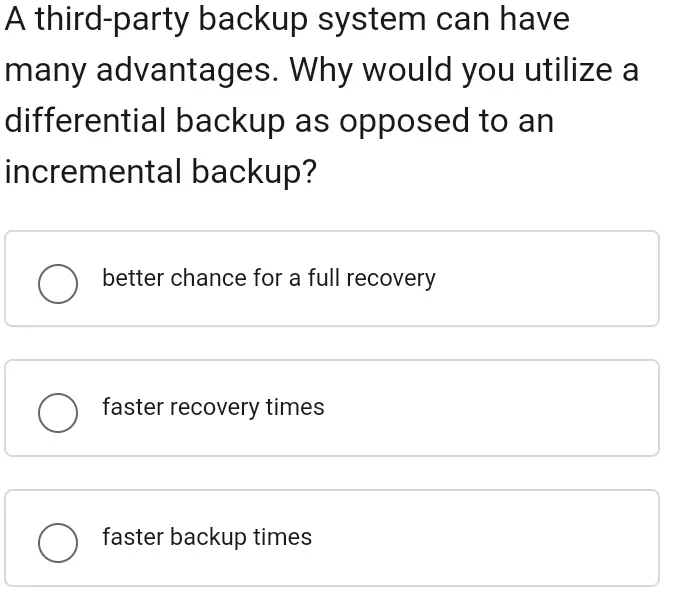Homework Help: Questions and Answers: A third-party backup system can have many advantages. Why would you utilize a differential backup as opposed to an incremental backup?

a) better chance for a full recovery
b) faster recovery times
c) faster backup times
Answer:
First, let’s understand Differential and Incremental Backups:
- Differential backup: Backs up all the changes made since the last full backup. Each new differential backup will grow larger as more data changes, but it simplifies recovery.
- Incremental backup: Backs up only the data that has changed since the last backup (whether full or incremental). Incremental backups are smaller and quicker but require multiple steps during recovery.
Given Options: Step by Step Answering
a) Better chance for a full recovery
- Both backup methods aim for a full recovery, but differential backups provide a simpler recovery process because they require only the last full backup and the most recent differential backup.
- Incremental backups need the last full backup and all subsequent incremental backups, increasing the risk of something going wrong during the recovery process. Therefore, differential backups offer a better chance for a smooth and complete recovery.
b) Faster recovery times
- Recovery times are typically faster with differential backups because you only need the last full backup and the most recent differential backup to restore the system.
- Incremental backups take longer to restore, as you have to restore the last full backup and each incremental backup in the sequence. Thus, differential backups lead to faster recovery times compared to incremental backups.
c) Faster backup times
- Incremental backups usually have faster backup times because they only back up the changes since the last backup (whether full or incremental).
- Differential backups are slower as they back up all changes since the last full backup, and the size of the differential backup grows over time. Therefore, incremental backups are faster in terms of backup time, not differential backups.
Final Answer:
Based on the above analysis, the correct answer is:
b: Faster recovery times
Differential backups are preferred over incremental backups when faster recovery times are a priority. This is because restoration from differential backups requires fewer backup sets and is generally quicker to process.
Learn More: Homework Help
Q. Which monitoring tool will show granular Windows Server hardware usage?
Q. What section of the Salesforce Operation allows you to limit the response set?